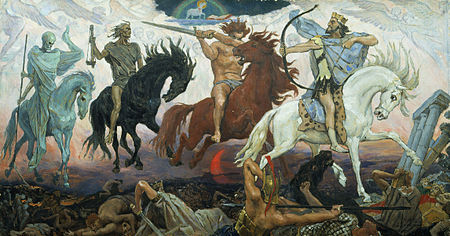https://www.facebook.com/hanching.chung/videos/222485313163073
The Four Horsemen of The Apocalypse (Spanish: Los cuatro jinetes del Apocalipsis) is a novel by the Spanish author Vicente Blasco Ibáñez. First published in 1916, it tells a tangled tale of the French and German sons-in-law of an Argentinian landowner who find themselves fighting on opposite sides during the First World War. Its 1918 English translation by Charlotte Brewster Jordan became the best-selling novel in the US in 1919 according to Publishers Weekly, which hailed it as "a superbly human story told by a genius." The novel was included in the list of 100 best novels of the 20th century by the Spanish newspaper El Mundo.[1]
Summary[edit]
A Frenchman, Marcelo Desnoyers, travels to Argentina in 1870 and marries the elder daughter of Julio Madariaga, the owner of a ranch. Eventually, Marcelo; his wife; and his children, Julio and Chichi, move back to France and live in a mansion in Paris. Julio turns out to be a spoiled lazy young man who avoids commitments and flirts with a married woman, Marguerite Laurier.
Meanwhile, Madariaga's younger daughter has married a German man, Karl Hartrott, and the Hartrotts move back to Germany. The Desnoyers family and the Hartrott family are thus set against each other with the onset of the First World War. However, Julio Desnoyers initially shows no interest in the war, but Hartrott's family eagerly supports the German cause. It is only after Julio's lover, Marguerite, lavishes attention upon her husband after the latter is wounded in battle that Julio is moved to participate in the war.
While the young Julio serves as a soldier, the aging Marcelo leaves the shelter and returns to his mansion, where he watches the German soldiers advance and eventually plunder his belongings and eat his food. At last, the French soldiers push back the German soldiers, and Marcelo chooses to defend a German man who spared Marcelo's life.
Julio Desnoyers returns to his family after he was wounded in a battle but praised for his valour, and he quickly sets out again to continue fighting. At the close of the war, Julio is killed in battle. The novel ends with Marcelo at his son's grave; he regrets that if his daughter, Chichi, has any children, they will not bear the name "Desnoyers." Marcelo finds that Hartrott also has lost a son in the war.
External links[edit]
 Spanish Wikisource has original text related to this article: Los cuatro jinetes del Apocalipsis
Spanish Wikisource has original text related to this article: Los cuatro jinetes del Apocalipsis- The Four Horsemen of the Apocalypse on Project Gutenberg (English translation)
- Los cuatro jinetes del apocalipsis on Project Gutenberg (Spanish original)
 The Four Horsemen of the Apocalypse public domain audiobook at LibriVox
The Four Horsemen of the Apocalypse public domain audiobook at LibriVox
Reviewed by SUSANN COKAL
Indeed, the idea of admitting one’s wealth, once considered déclassé, is becoming more acceptable. A cover story in the popular weekly magazine VSD this month included revelations that just a few years ago would have been unthinkable: the 2006 income of leading French personalities ($18 million for soccer star Zinedine Zidane, $12.1 million for rock star Johnny Hallyday, $334,000 for Prime Minister François Fillon, $109,000 for Mr. Sarkozy).
dé·clas·sé (dā'klä-sā') 
adj.
- Lowered in class, rank, or social position.
- Lacking high station or birth; of inferior social status.
默示錄 Revelation
| 若望默示錄/Revelation | [1] [2] [3] [4] [5] [6] [7] [8] [9] [10] [11] [12] [13] [14] [15] [16] [17] [18] [19] [20] [21] [22] |
apocalypse
noun [S or U]
1 a very serious event resulting in great destruction and change:
The book offers a vision of the future in which there is a great nuclear apocalypse.
2 the Apocalypse in the Bible, the total destruction and end of the world 啟示錄
apocalyptic
adjective
apocalyptic visions of a nuclear confrontation
apocalyptic warnings about our destruction of the environment
apocalyptic
(ə-pŏk'ə-lĭp'tĭk)  also apocalyptical (-tĭ-kəl)
also apocalyptical (-tĭ-kəl)
adj.
- Of or relating to an apocalypse.
- Involving or portending widespread devastation or ultimate doom: “now speaks in apocalyptic terms about the probable conflict ahead” (Financial Times).
- Characterized by usually exaggerated predictions of or allusions to a disastrous outcome: “Stripped of its apocalyptic tone, what this amounts to is an advocacy of teaching names, dates and places by rote” (Stefan Kanfer).
- Of a revelatory or prophetic nature.


!["The Great War" WWI film series continues this week with "The Four Horsemen of the Apocalypse," "Seventh Heaven," and more. http://bit.ly/1r5RnUP
["The Four Horsemen of the Apocalypse." 1921. USA. Directed by Rex Ingram.]](https://fbcdn-sphotos-b-a.akamaihd.net/hphotos-ak-xap1/t1.0-9/q82/p552x414/10526140_10153379959127281_7843075935602788071_n.jpg)

沒有留言:
張貼留言